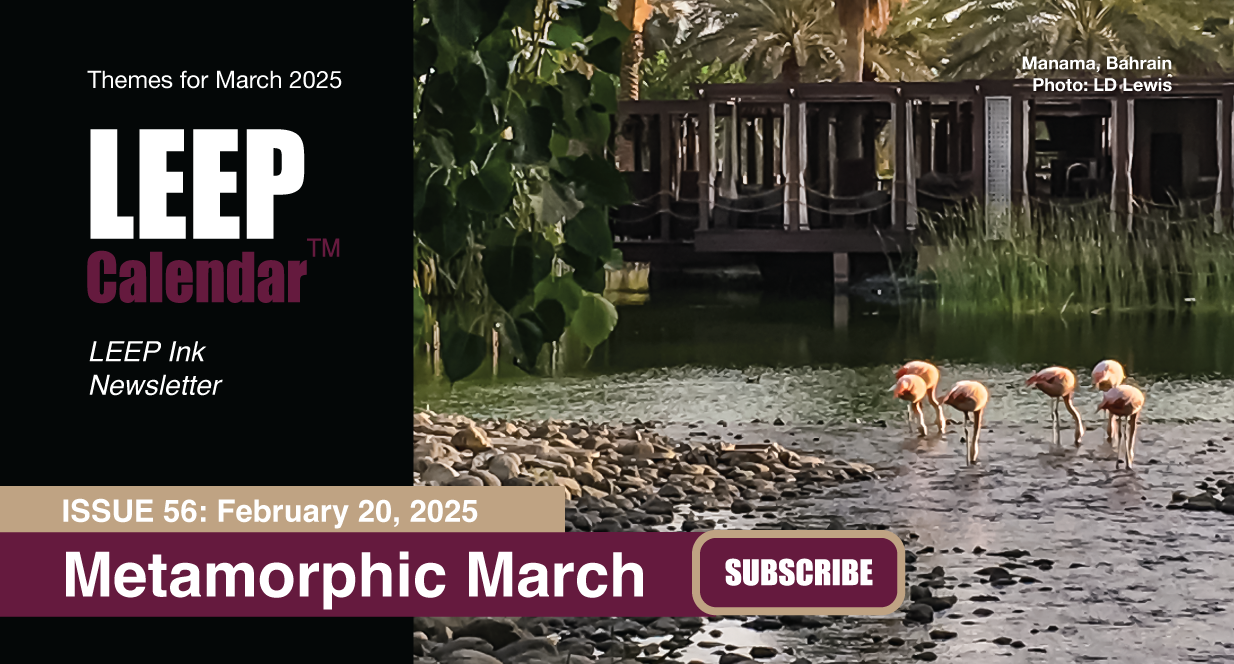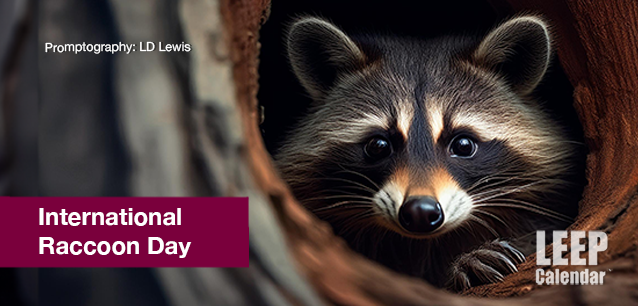 AD
AD
Today is: May 09
Scroll to explore events active on this date.
Additional Events on LEEP
LEEP INK FEATURES

Events in April 2025
Spring has sprung in the north, and the first hints of Autumn are on the horizon in the south. April is the month spring (or fall) gets underway, and it is filled with religious celebrations, including the Mu...

Metamorphic March: Trends and events in March 2025
Welcome to Spring or Autumn. This is a transitional month with something for everyone. Internationally, it is Women's History Month, focusing on the achievements, needs, and challenges that women ...

February Favorites
The world steps into the second month of 2025 with hope and trepidation. The United States has a new administration. Canada is finding its way to a new administration. Germany and several other European nations...
About International Raccoon Day
United States
Ends: Oct 01, 2025
DESCRIPTION:
NATURE'S BANDITS:
INTERNATIONAL RACCOON DAY
International Raccoon Day is an annual event dedicated to raising awareness about raccoons, their behavior, and their ecological role in various environments. Celebrated on October 1st, the day promotes the conservation of raccoons and educates the public about these often misunderstood creatures. The event also aims to highlight the importance of living harmoniously with wildlife, particularly in urban settings where human-raccoon interactions are common.
Wildlife organizations, animal rehabilitation centers, and conservationists champion International Raccoon Day, which seeks to protect raccoons and their habitats. While no single organization is behind International Raccoon Day, it has gained traction through the efforts of wildlife enthusiasts and advocacy groups that use the day to promote educational activities and conservation initiatives.
Participation in International Raccoon Day can take many forms. People are encouraged to learn more about raccoons, share information on social media, and support local wildlife rehabilitation efforts. Some communities organize events such as educational workshops, wildlife tours, or talks about raccoons and their natural habitats. Additionally, participants are encouraged to adopt wildlife-friendly practices, such as securing trash bins and avoiding feeding raccoons, to reduce potential conflicts with these animals.
WHAT ARE RACCOONS?
Raccoons are medium-sized mammals native to North America, known for their distinctive black "mask" of fur around their eyes and highly dexterous front paws. The scientific name for the common raccoon is Procyon lotor. They are omnivorous, meaning they eat various foods, including fruits, nuts, insects, and small animals. Raccoons are highly adaptable, living in multiple environments, including forests and wetlands, to urban areas where they often scavenge for food.
Raccoons are most commonly associated with North America, particularly the United States, Canada, and Mexico. However, through trade, they have also been introduced to parts of Europe and Asia. In their natural habitat, raccoons typically live in dens in hollow trees, caves, or abandoned burrows; in urban areas, they may reside in attics, chimneys, or under decks.
RACCOON SPECIES
There are seven recognized species of raccoon, with the common raccoon (Procyon lotor) being the most widespread and well-known. The other species include:
—Crab-eating raccoon (Procyon cancrivorus):
Found in South and Central America, this species is often found near water and is known for its diet of crabs and other aquatic animals.
—Cozumel raccoon (Procyon pygmaeus):
A smaller species endemic to Cozumel Island off the coast of Mexico, it is critically endangered due to habitat loss.
—Bahaman raccoon (Procyon maynardi):
Native to the Bahamas, this species is similar in appearance to the common raccoon but is geographically isolated.
—Guadeloupe raccoon (Procyon minor):
Found on the island of Guadeloupe in the Caribbean, this species is closely related to the common raccoon but is smaller in size.
—Tres Marias raccoon (Procyon insularis):
This species is endemic to the Tres Marias Islands off the coast of Mexico. It is also smaller than the common raccoon.
—Barbados raccoon (Procyon gloveralleni):
Now extinct, this species was native to Barbados and is believed to have disappeared due to human activity.
International Raccoon Day provides an opportunity to celebrate these fascinating animals while encouraging people to protect raccoons and their habitats. By fostering a better understanding of raccoons and their ecological importance, the event helps to promote coexistence between humans and wildlife.
VIDEOS
SUPPORTING DOCUMENTS
Currently, this event does not have supporting documents.
ADDITIONAL IMAGES
Currently, this event does not have supporting images.
Where would you like to go now?
 AD
AD


/footer-logo.svg)
